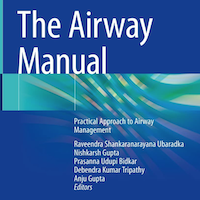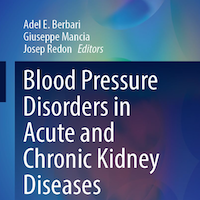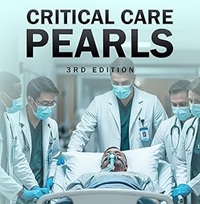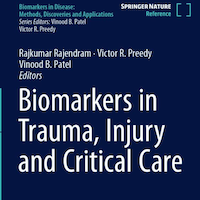Tag: echocardiography
Metabolic Acidosis Worsens Cardiac Function and Vasopressor Needs in Septic Shock
In a prospective observational study conducted from January to December 2024 at Hospital de Especialidades No. 14, IMSS, in Veracruz, Mexico, researchers examined the cardiovascular effects of acute metabolic acidemia in... read more
Bedside Procedures for the Intensivist
Bedside Procedures for the Intensivist delivers practical tips and clear, step-by-step instruction on the most common procedures in the ICU. The convenient and portable handbook focuses on ultrasound-guided techniques, including... read more

Hemodynamic Monitoring Using Echocardiography in the Critically Ill
The hemodynamic evaluation of patients with acute circulatory failure and respiratory failure has in the past usually been performed using invasive procedures but in recent years less invasive monitoring devices have been... read more

Echocardiography and Ultrasonography in the ICU: A Comprehensive Text (Respiratory Medicine)
This is a comprehensive textbook on the emerging field of critical care ultrasound and echocardiography. These imaging modalities are being used increasingly in the ICU, and this book contains more detail than any other book... read more

Critical Care Ultrasonography Usage in the Management of Cardiogenic Shock
Despite advancements in treatment, cardiogenic shock (CS) still has a very high mortality rate. To improve patient outcomes, a timely diagnosis and the correct management are crucial. This is especially true given the changing... read more
Hemodynamics in the Echocardiography Laboratory
The book provides a practically focused review of the latest techniques used for hemodynamic assessment in the echocardiography laboratory. It features a methodical case-based approach covering how to measure hemodynamic... read more

Dynamic Left Ventricular Outflow Tract Obstruction Induced by IABP in Patient with Angioedema
Mechanical circulatory support with intra-aortic balloon pump (IABP) can aid in the treatment of cardiogenic shock but may rapidly become detrimental due to the reduction in systolic arterial afterload in patients with predispositions... read more
Massive Pulmonary Embolism with Clot in Transit Using Fluoroscopic and Transthoracic Echocardiographic-Guided Large-Bore Mechanical Thrombectomy
Massive pulmonary embolism (PE) is a life-threatening condition caused by the obstruction of pulmonary arteries requiring precise and timely intervention to prevent mortality. Clots in transit (CIT), which are thrombi... read more
Epidemiology of Myocardial Injury in Trauma Patients
Pathological Troponin concentration elevation occurs in 7% of all trauma patients and it identifies the seriously injured high-risk cohort with worse outcomes than expected based on injury severity. The timing of the... read more
Mortality Predictor with sPAP in Elderly Critically Ill with Severe COVID-19 Pneumonia
Mortality in general ARDS patients remains high, with many experiencing long-lasting sequelae. Numerous studies have been conducted to identify predictors of mortality in COVID-19 patients, particularly regarding right ventricular... read more
Heart Rate Control in Septic Shock: Echocardiographic Evaluation and Monitoring
Our study demonstrated a modest reduction in heart rate by approximately 10 beats per minute, accompanied by a slower decrease in noradrenaline requirements com-pared to the control group in the overall population. This... read more
Troponin Role in the Diagnosis and Treatment of Acute Pulmonary Embolism
Acute pulmonary embolism (APE) is a cardiovascular disease with severe consequences, wherein cardiac troponin (Tn) plays a pivotal role in diagnosis and treatment. This article reviews the various roles of Tn in managing... read more
Oxford Textbook of Advanced Critical Care Echocardiography
Advanced critical care echocardiography brings many benefits to critical care medicine. For those wishing to practice echo at a more advanced level, it is necessary to master the theoretical aspects. The Oxford Textbook... read more

Correlation of Common Carotid Artery Blood Flow Parameters With TTE-CO for Assessing Fluid Responsiveness After PLR Test in Critically Ill Patients
The passive leg raising (PLR) test is a simple, non-invasive method of knowing fluid responsiveness by acting as an internal-fluid challenge. The PLR test coupled with a non-invasive assessment of stroke volume would be the... read more
Fluid Responsiveness Evaluation with Integrated Ultrasonographic Approach
In a group of non-ventilated patients, who had already undergone the initial resuscitation, we demonstrated that the evaluation of the fluid responsiveness (FR) based on echocardiography and lung ultrasound increased the... read more
TEE Before Cardioversion in Atrial Fibrillation Patients
Transesophageal echocardiography (TEE) offers an invaluable, non-invasive avenue for diagnosing and managing various cardiac conditions, including atrial fibrillation (AF). As the most common cardiac arrhythmia, AF affects... read more
Esophageal Adenocarcinoma Causing Nonbacterial Thrombotic Endocarditis
Nonbacterial thrombotic endocarditis (NBTE) is a rare condition that causes noninfectious vegetative lesions of heart valves. NBTE is generally seen in association with advanced malignancy. The patient in this case is a 54-year-old... read more
Rescue TEE Might Diagnose Cardiac Arrest Faster
A Penn Medicine team is testing whether a new technology that gives live ultrasound images from inside a patient during CPR can help doctors get those answers faster. The device, called Rescue TEE, uses a tiny camera at the... read more
Resuscitative TEE
The use of ED resuscitative transesophageal echocardiography (TEE) is a practical modality that provides useful diagnostic and therapeutic information for critically ill patients in the emergency department, with an excellent... read more
Cardiovascular Subphenotypes in ARDS
Latent class analysis (LCA) of transthoracic echocardiography (TTE) parameters identified four cardiovascular subphenotypes in acute respiratory distress syndrome (ARDS) that more closely aligned with circulatory failure... read more
Evaluation of an Advanced Critical Care Echocardiography Program
Trainees perceived lack of time and limited access to supervision as major barriers to course completion. Nevertheless, successful portfolio completion was related to factors other than protected time in the echocardiography... read more
A Decade of Progress in Critical Care Echocardiography
Critical care echocardiography (CCE) is now widely accepted by the critical care community as a valuable tool in the ICU and emergency department, and in perioperative settings. It allows rapid and accurate diagnosis,... read more









